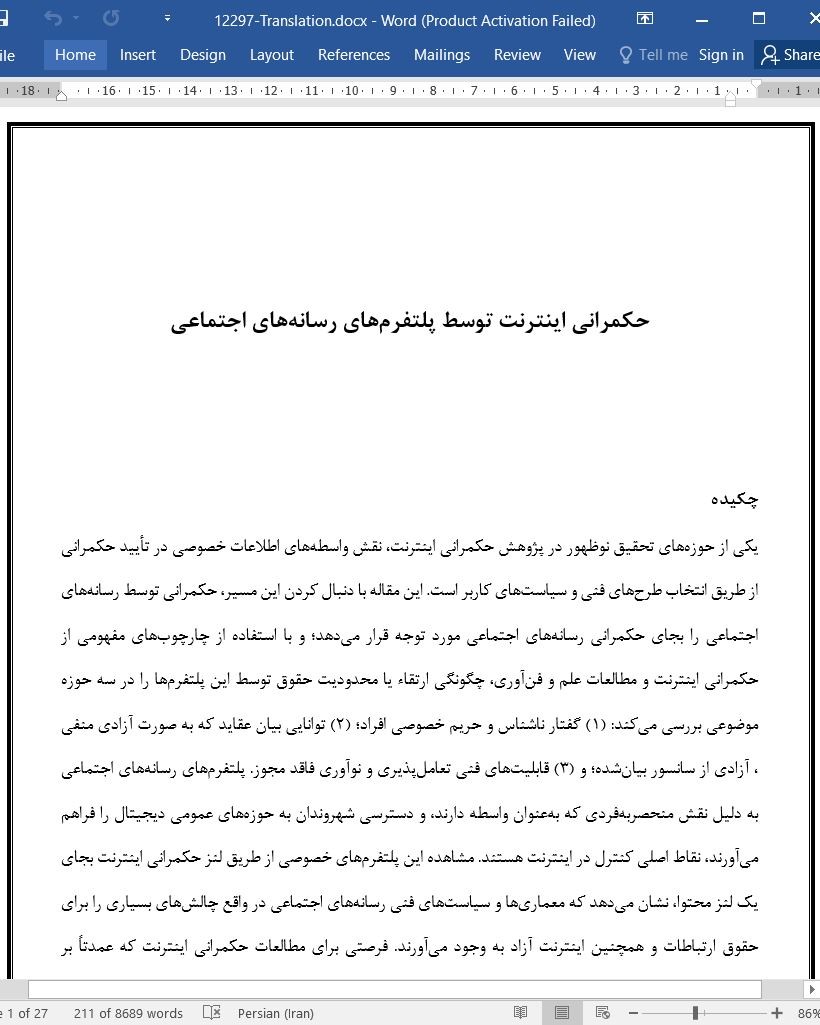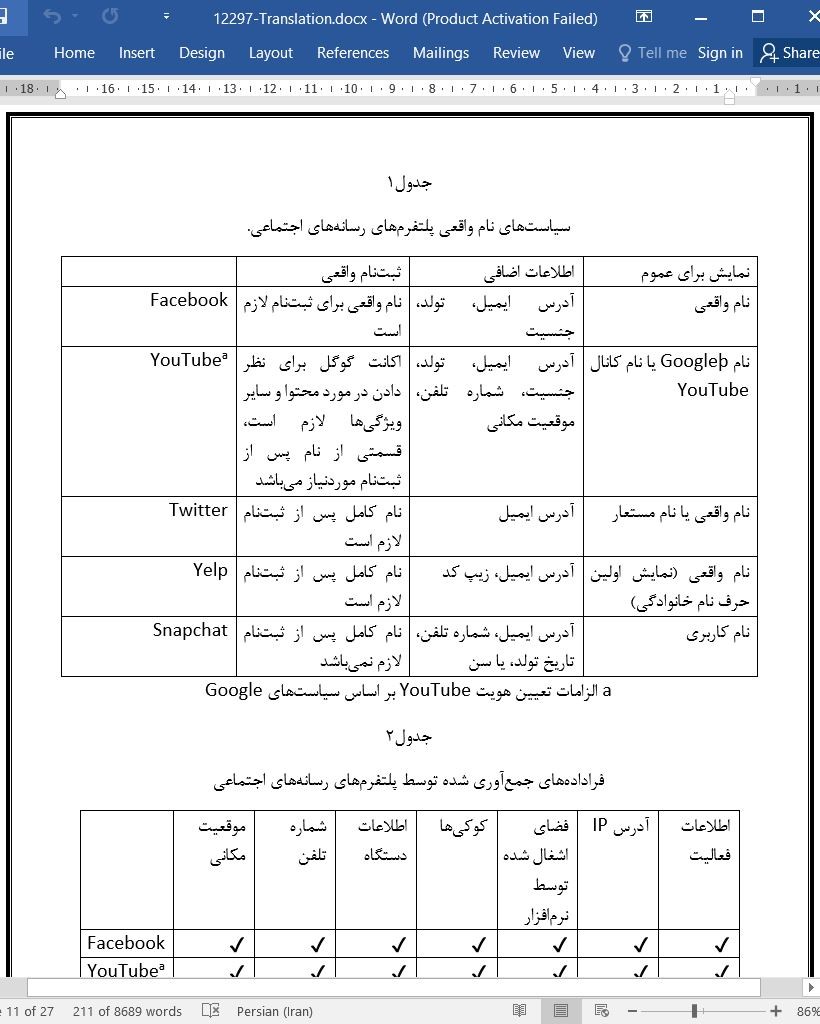
حکمرانی اینترنت توسط پلتفرمهای رسانههای اجتماعی
چکیده
یکی از حوزههای تحقیق نوظهور در پژوهش حکمرانی اینترنت، نقش واسطههای اطلاعات خصوصی در تأیید حکمرانی از طریق انتخاب طرحهای فنی و سیاستهای کاربر است. این مقاله با دنبال کردن این مسیر، حکمرانی توسط رسانههای اجتماعی را بجای حکمرانی رسانههای اجتماعی مورد توجه قرار میدهد؛ و با استفاده از چارچوبهای مفهومی از حکمرانی اینترنت و مطالعات علم و فنآوری، چگونگی ارتقاء یا محدودیت حقوق توسط این پلتفرمها را در سه حوزه موضوعی بررسی میکند: (1) گفتار ناشناس و حریم خصوصی افراد؛ (2) توانایی بیان عقاید که به صورت آزادی منفی ، آزادی از سانسور بیانشده؛ و (3) قابلیتهای فنی تعاملپذیری و نوآوری فاقد مجوز. پلتفرمهای رسانههای اجتماعی به دلیل نقش منحصربهفردی که بهعنوان واسطه دارند، و دسترسی شهروندان به حوزههای عمومی دیجیتال را فراهم میآورند، نقاط اصلی کنترل در اینترنت هستند. مشاهده این پلتفرمهای خصوصی از طریق لنز حکمرانی اینترنت بجای یک لنز محتوا، نشان میدهد که معماریها و سیاستهای فنی رسانههای اجتماعی در واقع چالشهای بسیاری را برای حقوق ارتباطات و همچنین اینترنت آزاد به وجود میآورند. فرصتی برای مطالعات حکمرانی اینترنت که عمدتاً بر سیاستهای دولت و نهادهای جهانی جدید متمرکز شدهاند وجود دارد تا توجه بیشتری به نقش سیاستگذاری مستقیم واسطههای خصوصی و پدیده همراه با آن یعنی خصوصیسازی حقوق بشر داشته باشند.
1. لنز حکمرانی اینترنت بهسوی پلتفرمهای رسانههای اجتماعی
بیشتر پژوهشهای مربوط به سیاست رسانههای اجتماعی بر مسائل مربوط به محتوا و کاربرد آن متمرکز شدهاند، مانند رابطه سودمند بین رسانههای اجتماعی و تحولات سیاسی (Howard و همکاران، 2011)، استفاده از این پلتفرمها برای خودنمایی (boyd & Ellison، 2007؛ Correa، Willard Hinsley، & Gil de Zuniga، 2010؛ Gray، 2009؛ Marwick & boyd، 2010؛ Tufekci، 2008)، و روشهایی که در آن استفاده از رسانههای اجتماعی آزادی بیان گسترش مییابد و اشکال جدید روزنامهنگاری شهروندی، رسانههای جایگزین و اختلاف عقیده تسهیل میشود (Lynch، Freelon & Aday، 2014). این سؤالات عمدتاً بر محتوا متمرکز میشوند نه بر حوزه زیرساختهای فنی که کمتر قابلمشاهده هستند و از محتوای رسانههای اجتماعی حمایت میکنند.
5. چالش رسانههای اجتماعی برای حکمرانی اینترنت
پلتفرمهای رسانههای اجتماعی با توجه به نقش مهمی که بهعنوان واسطه برای دستیابی شهروندان به حوزه عمومی دیجیتال ایفا میکنند، نقاط اصلی کنترل در اینترنت هستند. با بررسی مقایسهای نحوه تأیید حکمرانی پلتفرمهای رسانههای اجتماعی در سه حوزه موضوعی که در این مقاله پژوهشی عنوان شد- حریم خصوصی، بیان و همچنین تعاملپذیری و نوآوری فاقد مجوز- مشخص میشود که رابطهای مختلفی وجود دارند که بهواسطه آنها این شرکتها قدرت مستقیمی را بر حقوق آنلاین اعمال میکنند. آنها از طریق توانایی حذف یا مسدود کردن محتوا به خواست خود، مستقیماً با محتوا ارتباط برقرار میکنند؛ از طریق قابلیتهای تکنولوژیکی طراحی سیستم با مشترکین، و از طریق شرایط استفاده از خدمات و با نقش خود بهعنوان واسطههایی که اجرای قانون و سانسور محول شده را به عهده دارند با دولتها ارتباط برقرار میکنند، و با نهادهای دیگر نیز از طریق پروتکلها ، مدلهای تجاری و رابطهای فنآوری ارتباط برقرار مینمایند. هر یک از این رابطها را میتوان بهعنوان نقطه انسداد اطلاعات در نظر گرفت که چگونگی جریان اطلاعات را مشخص میکنند. بهطور خلاصه، نقش حکمرانی پلتفرمهای رسانههای اجتماعی نهتنها تثبیت شده است بلکه به طرق مختلفی جدا از آنچه بیشتر بهعنوان نقش سیاسی شرایط استفاده از خدمات و سایر موافقتنامههای کاربر به نظر میرسد، صورت میگیرد.
Abstract
An emerging area of inquiry in Internet governance scholarship is the role of private information intermediaries in enacting governance via technical design choices and user policies. Following this trajectory, this paper addresses governance by social media rather than governance of social media. Informed by conceptual frameworks from Internet governance and Science and Technology Studies, it examines the extent to which these platforms either promote or constrain rights in three thematic areas: (1) anonymous speech and individual privacy; (2) the ability to express ideas or, stated as a negative liberty, freedom from censorship; and (3) technical affordances of interoperability and permissionless innovation. Because of their unique role as the intermediaries providing citizens with access to the digital public sphere, social media platforms are central points of control on the Internet. Viewing these private platforms through an Internet governance lens, rather than a content lens, suggests that social media technical architectures and policies actually pose several challenges to communication rights as well as to the open Internet. There is an opportunity for Internet governance studies, which have primarily focused on governmental policies and new global institutions, to give greater consideration to the direct policymaking role of private intermediaries and the accompanying phenomenon of the privatization of human rights.
1. An Internet governance lens into social media platforms
Much scholarship related to the politics of social media has focused on content and usage issues, such as the salutary relationship between social media and political transformation (Howard et al., 2011), the use of these platforms for selfrepresentation (boyd & Ellison, 2007; Correa, Willard Hinsley, & Gil de Zuniga, 2010; Gray, 2009, Marwick & boyd, 2010; Tufekci, 2008), and ways in which social media usage expands freedom of expression and facilitates new forms of citizen journalism, alternative media, and dissent (Lynch, Freelon, & Aday, 2014). These inquiries are primarily focused on content rather than the less visible area of the technical infrastructure supporting social media content.
5. The social media challenge to Internet governance
Given their significant role as intermediaries providing citizens with access to the digital public sphere, social media platforms are central points of control on the Internet. By comparatively examining how social media platforms enact governance in the three thematic areas mentioned in this research paper – privacy, expression as well as interoperability and permissionless innovation – it becomes clear that there are several interfaces in which these companies exert direct power over online rights. They interface directly with content via their ability to delete or block content at will; with subscribers, via the technological affordances of system design and via terms of service; with governments, by serving as the intermediaries that carry out delegated law enforcement and delegated censorship; and with other institutions, via protocols, business models and technological interfaces. Each of these interfaces can be viewed as an information choke point determining how information flows. In short, the governance role of social media platforms is not only entrenched, it takes place in various ways outside of what most view as the policy role of terms of service and other user agreements.
چکیده
1. لنز حکمرانی اینترنت بهسوی پلتفرمهای رسانههای اجتماعی
2.سیاستهای پلتفرمهای رسانههای اجتماعی در مورد حریم خصوصی و ناشناس ماندن
2.1 سیاستهای شناسایی نام واقعی
2.2 جمعآوری فرادادههای جهانی
2.3 افشای دادههای شخص ثالث
2.4 متعادلسازی حریم خصوصی و مدلهای تجاری سودآور
3 خصوصیسازی سیاستهای آزادی بیان
4 تنش رسانههای اجتماعی با تعاملپذیری و نوآوری فاقد مجوز
5 چالش رسانههای اجتماعی برای حکمرانی اینترنت
منابع
Abstract
1. An Internet governance lens into social media platforms
2. Social media platform policies on privacy and anonymity
2.1. The politics of real name identification policies
2.2. Universal metadata collection
2.3. Third party data disclosure
2.4. Balancing privacy and profitable business models
3. The privatization of freedom of expression policies
4. Social media tension with interoperability and permissionless innovation
5. The social media challenge to Internet governance
References
- اصل مقاله انگلیسی با فرمت ورد (word) با قابلیت ویرایش
- ترجمه فارسی مقاله با فرمت ورد (word) با قابلیت ویرایش، بدون آرم سایت ای ترجمه
- ترجمه فارسی مقاله با فرمت pdf، بدون آرم سایت ای ترجمه



